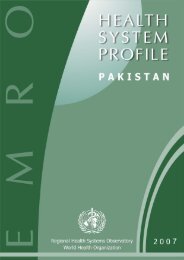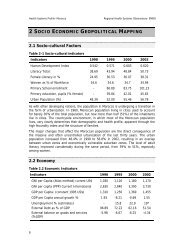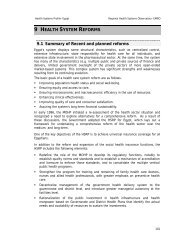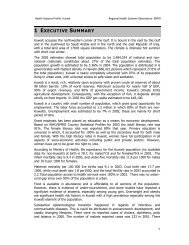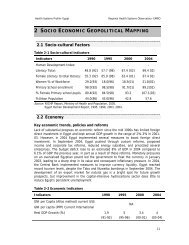The role of contractual arrangements in improving health sector ...
The role of contractual arrangements in improving health sector ...
The role of contractual arrangements in improving health sector ...
Create successful ePaper yourself
Turn your PDF publications into a flip-book with our unique Google optimized e-Paper software.
<strong>The</strong> <strong>role</strong> <strong>of</strong> <strong>contractual</strong> <strong>arrangements</strong> <strong>in</strong> improv<strong>in</strong>g <strong>health</strong> <strong>sector</strong> performance<br />
<strong>The</strong> most common payment method is block payment made aga<strong>in</strong>st an agreed set <strong>of</strong><br />
activities and outputs. However, there are examples <strong>of</strong> payments to private <strong>sector</strong><br />
providers on the basis <strong>of</strong> fee-for-service, and <strong>in</strong>demnification and prepayment. Both<br />
public <strong>sector</strong> managers and most private <strong>sector</strong> organizations have limited ability to<br />
undertake cost and pric<strong>in</strong>g analysis.<br />
<strong>The</strong> M<strong>in</strong>istry <strong>of</strong> Health does not have the capacity to monitor and evaluate ongo<strong>in</strong>g<br />
projects efficiently, even if monitor<strong>in</strong>g <strong>in</strong>dicators are identified. <strong>The</strong>re is thus no regular<br />
arrangement for collect<strong>in</strong>g data on project outputs or outcomes. Independent reviews are<br />
sometimes undertaken through donor support. <strong>The</strong> M<strong>in</strong>istry does not ma<strong>in</strong>ta<strong>in</strong> a database<br />
<strong>of</strong> the private <strong>sector</strong> partners accord<strong>in</strong>g to their areas <strong>of</strong> expertise or work experience.<br />
Syrian Arab Republic<br />
Although the number <strong>of</strong> government contracts with the private <strong>sector</strong> almost<br />
doubled from 260 to 492 dur<strong>in</strong>g the period 2001–2003, most contract<strong>in</strong>g <strong>in</strong> the Syrian<br />
Arab Republic is done for non-cl<strong>in</strong>ical services. <strong>The</strong> areas covered <strong>in</strong>clude ma<strong>in</strong>tenance<br />
<strong>of</strong> hospitals and equipment and cater<strong>in</strong>g, clean<strong>in</strong>g and construction services. <strong>The</strong> M<strong>in</strong>istry<br />
<strong>of</strong> Health cont<strong>in</strong>ues to promote a policy <strong>of</strong> direct provision <strong>of</strong> <strong>health</strong> services through the<br />
establishment <strong>of</strong> new hospitals and <strong>health</strong> centres <strong>in</strong>stead <strong>of</strong> contract<strong>in</strong>g out <strong>health</strong><br />
services to the private <strong>sector</strong>. <strong>The</strong> M<strong>in</strong>istry <strong>of</strong> Health owns 80% <strong>of</strong> the <strong>health</strong> <strong>in</strong>stitutions<br />
<strong>in</strong> the country and is plann<strong>in</strong>g to establish an additional 74 new hospitals and 350 <strong>health</strong><br />
centres dur<strong>in</strong>g 2006–2010.<br />
<strong>The</strong> overall political and bureaucratic environment is not conducive to contract<strong>in</strong>g<br />
out <strong>health</strong> services at present, nonetheless there is grow<strong>in</strong>g keenness among the private<br />
<strong>sector</strong> to enter <strong>in</strong>to <strong>contractual</strong> <strong>arrangements</strong>, as such <strong>arrangements</strong> would <strong>of</strong>fer a reliable<br />
source <strong>of</strong> revenue, raise the volume <strong>of</strong> under-utilized services and add to the credibility <strong>of</strong><br />
services.<br />
<strong>The</strong> lack <strong>of</strong> experience <strong>in</strong> contract<strong>in</strong>g out <strong>of</strong> cl<strong>in</strong>ical services <strong>in</strong> Syrian Arab<br />
Republic may be attributed to several factors, important among them be<strong>in</strong>g: historical<br />
policy <strong>of</strong> direct provision <strong>in</strong> most social <strong>sector</strong>s; lack <strong>of</strong> knowledge and trust <strong>of</strong> the<br />
advantages that each has to <strong>of</strong>fer; and lack <strong>of</strong> experience <strong>in</strong> the public and private <strong>sector</strong>s<br />
<strong>in</strong> negotiation <strong>of</strong> contracts, their preparation, management, monitor<strong>in</strong>g and evaluation.<br />
Tunisia<br />
<strong>The</strong> Tunisian <strong>health</strong> system has made use <strong>of</strong> <strong>contractual</strong> <strong>arrangements</strong> s<strong>in</strong>ce 1970,<br />
when the Social Security Fund agreed to pay a lump sum amount to the national treasury<br />
for <strong>health</strong> care provided to their affiliate members and their dependents. <strong>The</strong> process <strong>of</strong><br />
contract<strong>in</strong>g has greatly developed s<strong>in</strong>ce then. In 1987, contract<strong>in</strong>g with the private <strong>sector</strong><br />
<strong>in</strong> Tunisia received a boost when it was realized that the social security fund had to pay<br />
19







